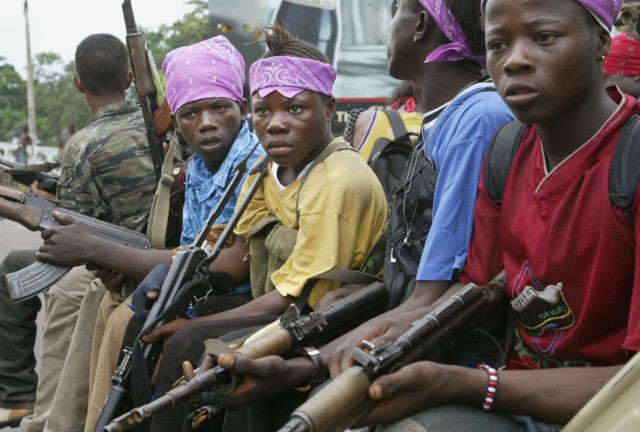State armies and non-state armed groups in West and Central Africa recruit the highest numbers of child soldiers in the world according to a United Nations Children’s Fund (UNICEF) report released Tuesday.
“Since 2005, almost one out of every two children (42,000 children) verified as recruited and used by armed forces and non-state armed groups globally was in the West and Central Africa region,” the study, published on November 23, found. “In 2020 alone, the United Nations verified that more than 4,500 children were recruited and used by armed forces and non-state armed groups (77 percent were boys).”
UNICEF further revealed on Tuesday that the West and Central Africa region reports the highest rate of sexual violence against children worldwide. The conflict-ridden area “has the largest number of United Nations verified cases of sexual violence against children, including rape, since 2005.”
“With more than 8,000 children victims of sexual violence since 2005, the region accounts for 57 percent of all verified instances of sexual violence committed against children globally,” the report stated.
The West and Central Africa region reports the second-highest number of child abductions in the world, as verified by the U.N. UNICEF has documented “more than 4,800 children verified as abducted” in the region since 2005.
“In 2020 alone, more than 1,300 children were abducted, including an increasing number of girls who accounted for 34 percent of all children abducted in the region,” the agency relayed.
UNICEF defined the West and Central Africa region referred to in its report as an area containing several nations, including Mauritania. Four of the countries — Niger, Mali, the Democratic Republic of the Congo, and the Central African Republic — have been included in UNICEF’s annual report on children’s rights violations for “eight years or more,” according to the agency. The U.N. added Burkina Faso and two nations straddling the Lake Chad basin — Cameroon and Chad — to its list of children’s rights violators for 2020.
UNICEF on Tuesday urged aid groups to “increase the documentation of violations and to work to prevent and respond to them” in the West and Central Africa region. The U.N.’s call for more fieldwork in the Lake Chad basin comes just 24 hours after Boko Haram released video footage appearing to show a UNICEF worker held hostage by the Nigerian terror group.
“One of the victims, who introduced himself as Zakaria Azirkime, said he is a staff [member] of UNICEF and was abducted on the Maiduguri-Damboa road,” Nigeria’s Premium Times newspaper reported on November 22 after reviewing the video footage.
Azirkime details in the video that he was traveling along a road linking Maiduguri, the capital of northeastern Nigeria’s Borno state, to the nearby town of Damboa on October 3 when he was “abducted” by Boko Haram militants.
“I am still in their custody as I speak now today [November 21],” the UNICEF employee confirmed.
Boko Haram is an Islamist terror group that originated in northeastern Nigeria in 2009 based on “an especially militant interpretation of Sunni Islam” that rejects “Western education and influence,” according to the U.S. Congressional Research Service (CRS).
The terror group has carried out violent and deadly attacks across the Lake Chad basin — which connects Nigeria to neighboring Chad, Cameroon, and Niger — for over a decade with the express purpose of establishing an Islamic caliphate in West Africa. Boko Haram’s jihadist insurgency has killed about 350,000 people throughout the Lake Chad region since 2009 and displaced an estimated three million others. The terror group is perhaps most infamous for its April 2014 abduction of 276 mostly Christian schoolgirls from a state boarding school in Chibok, a village in Nigeria’s Borno state. Over 100 of the Chibok girls remain missing today.

COMMENTS
Please let us know if you're having issues with commenting.